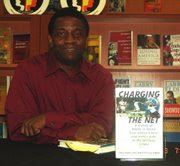
Maybe you were like me on that weekday afternoon a month ago, watching President Barack Obama on TV answering serious questions from real Americans at a town hall meeting in
“There is believed to be a 6-year-old boy inside that balloon,” the CNN anchorwoman said breathlessly.
How is that possible? I wondered.
This can’t be true.
I switched to MSNBC and saw the same giant popcorn bag.
I put on Headline News.
Jiffy Pop.
As a last resort, I switched to Fox News Channel.
Jiffy Pop.
Everybody’s showing the Jiffy Pop bag and talking about “Balloon Boy.”
This kid is so big he bumped the president off every network!
We know by now the story was a hoax and the so-called “Balloon Boy” was honest enough to call out his scheming parents, telling reporters, “They told me to stay in the attic because they were doing something for a show.”
For this and other similarly impudent acts, I blame Lucy.
Lucy Ricardo. The original Desperate Housewife.
Through reruns shown for more than a half-century in every conceivable language, Lucy has taught the world that everybody should be in the show, and needs to be in the show.
Lucy's goal, back in the quaint 19'50s, was stardom at the Tropicana, the nightclub where her bandleader-husband held sway.
A so-called “reality” show, just like the erstwhile rapper with the oversized clock around his neck, or the stripper who says she got sacked by the football player, or the single mother of six with no source of income who proudly popped out eight more.
Heck, she’s her own brand now.
Octomom ®.
It’s all Lucy’s fault.
Yesterday’s Vitameatavegamin pitchgirl is tonight’s prime-time player on Bravo.
Lucy once rode the
And when Lucy presented it—with her head still attached to it—we laughed.
She was funny. She was adorable.
Unfortunately, she inspired a cult.
This week, the Cult of Lucy gave us two married Washington, D.C.-area residents who crashed Barack Obama’s first state dinner at the White House.
Upstaging the president again?
On their Facebook page (a prerequisite for all Lucy cultists), we see the couple in formal wear greeting the president on the receiving line and smiling with Vice President Joe Biden and Chief of Staff Rahm Emanuel.
“They could have had anthrax on them," Congressman Peter King of
That’s coming next, if these cultists aren’t stopped.
The D.C. cultists lied about being invited to the dinner, and got a camera crew to follow their high-society trespassing in the hopes of landing a gig on “The Real Housewives of D.C.”
Why, of course.
And they’ve already been booked on CNN's “Larry King Live” next week.
Oh, sure. Had to happen.
And the female cultist says she wants to be a host on the “Today” show.
She would probably be an improvement over Kathie Lee Gifford, but that’s beside the point.
Starstruck Lucy was a problem only for Ricky, but her cultists have raised her naked ambition to the 10th power. Their obsessive desire to be in the show has become dangerous—and criminal.
So let’s give them all a show of their own.
The network and time slot are already available.
MSNBC.
Saturday nights,
“Lockdown.”








